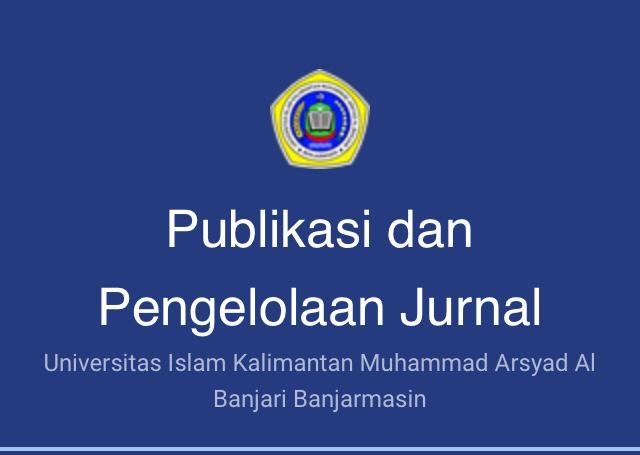MANAJEMEN PENGELOLAAN HARTA KEKAYAAN PADA PENGUSAHA MUSLIM DI MARTAPURA PERSPEKTIF EKONOMI SYARIAH
(1) Universitas Islam Kalimantan (UNISKA) MAB Banjarmasin
(2) Universitas Islam Kalimantan (UNISKA) MAB Banjarmasin
(*) Corresponding Author
Sari
Wealth management in moslem’s enterprenuer at Martapura is an orientation of this research. Besed on wealth management concept, the researcher try to explore how is their the wealth management concept so that their wealth bring blessings. The aim of this research to gire more explanation related on wealth management concept that done by moslem’s enterprenuer at Martapura. This research is a field research. Because of this research choices Martapura Kabupaten Banjar, so for reveling the problem, research apply sosiologic normative approach. in revaling and analyze the problem, research apply qualitative description opproach. So will found the answer from real condition that happened in the field. A series of those process make a description that thereaded (concatenated description) so easy to understand. The cunclosion of this research is moslem’s enterprenuer at Martapura have wealth management concept the oriented to Allah SWT’s blessings. So the steep and management schemesthat they did in eccordance with syari’s laws. But in orther side, there are several things that need to be anhanched aspecially, related to the management of incoe rest. They have preference in using to distribute directty better to allocated their fund in long term investment. So concept “Falah” in syariah economic understanding can be reached.
Keywords : Management, Wealth, Moslem’s, Enterprenuers.
Teks Lengkap:
PDFReferensi
Abdullah Lam Ibn Ibrahim, Fiqih Finansial, Solo: Era Intermedia, 2015.
Al-Syatibi, Al-Muwāfaqāt fi Usūl al-Syari’ah, (Bairut: Dār al-Ma’rifah , 1415H/1994M).
Asy Saibani, Al Ikhisab fir Rizqil Mustathab, Muthabi Offcet, t.k, tt.
Direktorat Jenderal Perkotaan dan Pedesaan, Data statistik Deputi bidang pengembangan regional dan otonomi daerah, tahun 2012.
Erwandi Tarmizi, Harta Haram Muamalat Kontemporer, Bogor: PT. Berkat Mulia Akbar tahun 2013.
Ibnu Katsir, Tafsir Ibnu Katsir, Muassasah Ar Risalah, tk., 2000.
Ibnu Sinā, Kitab al-Siyāsah. ed. Louis Ma’luf, in Louis Cheikho et. al, Maqālat Falsafiyyah Qadīmah li Ba’di Masyāhīrih Fālāsifah al-‘arab Muslimin wa Nasara, Beirut: al-Matba’ al-Kātsūlīkiyyah lil Abāi al-yasū’iyyin, 2011.
Ibnu Taimiyah, Majmu’ul Fatawa, Darul Makrifah: tt.
Ismāil Rājī al Fārūqi, Al Tawhid: Its Implication for Thought and Life, IIIT: USA, 1998.
Jafril Khaliil, Jihad Ekoomi Islam, Depok: Gramata Publishig, 2010.
Jaribah bin Ahmad Al Haritsi, Fiqih Ekonomi Umar bin Khattab,Jakarta: Khalifa, 2006.
Norman K. Denzin dkk, Hand Book Of Qualitative Researsch, Pustaka Pelajar: Yogyakarta, 2009.
Qur’an, Surah Al-Baqarah: Ayat 219, Text, Translation and Commentary by Abdullah Yusuf Ali, Dārul Arābiyyah: Beirut.tt.
System Ekonomi prinsif dasar Islam (fundamental of Islamic Economic System), Pranadamedia Group, Jakarta :Cetakan Ke 3 Januari 2016.)
Tim Pusat Pengkajian dan Pengembangan Ekonomi Islam UII, Ekonomi Islam, Yogyakarta: Rajawali Press, 2008.
DOI: http://dx.doi.org/10.31602/al-kalam.v4i1.833
Refbacks
- Saat ini tidak ada refbacks.

Al Kalam : Jurnal Komunikasi, Bisnis, dan Manajemen by https://ojs.uniska-bjm.ac.id/index.php/alkalam/index adalah ciptaan disebarluaskan di bawah Lisensi Creative Commons Atribusi-BerbagiSerupa 4.0 Internasional.









